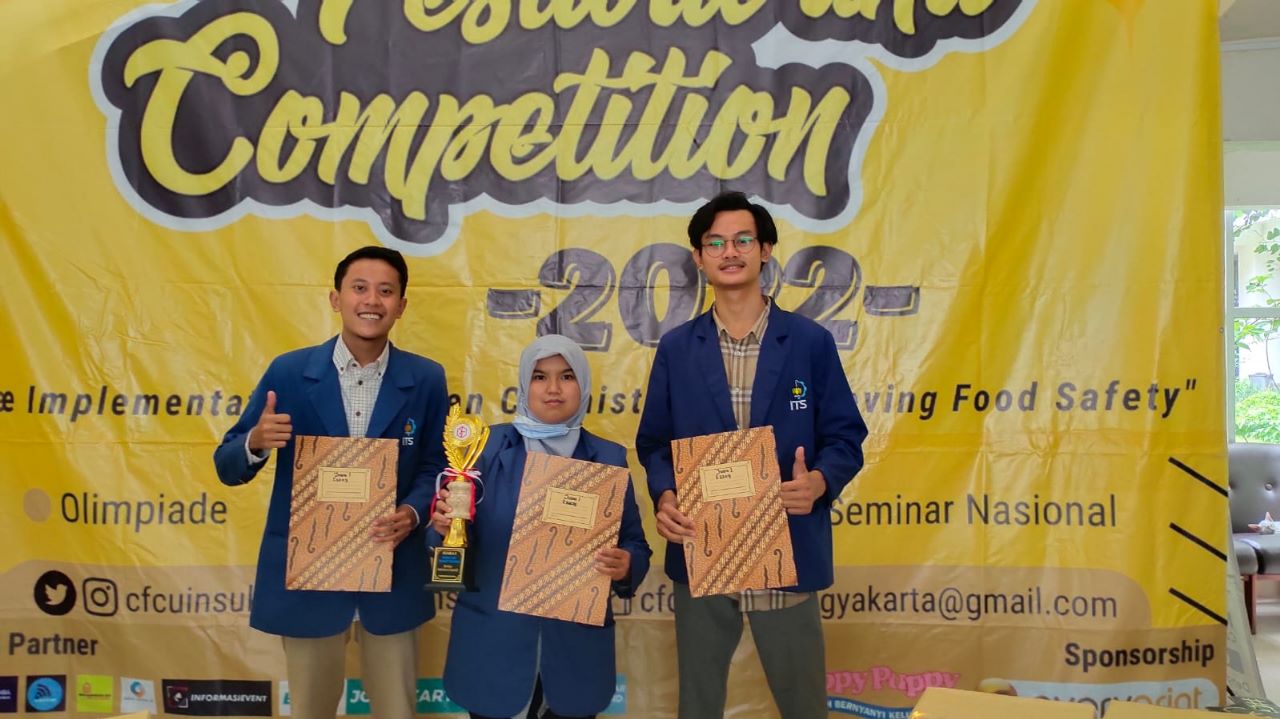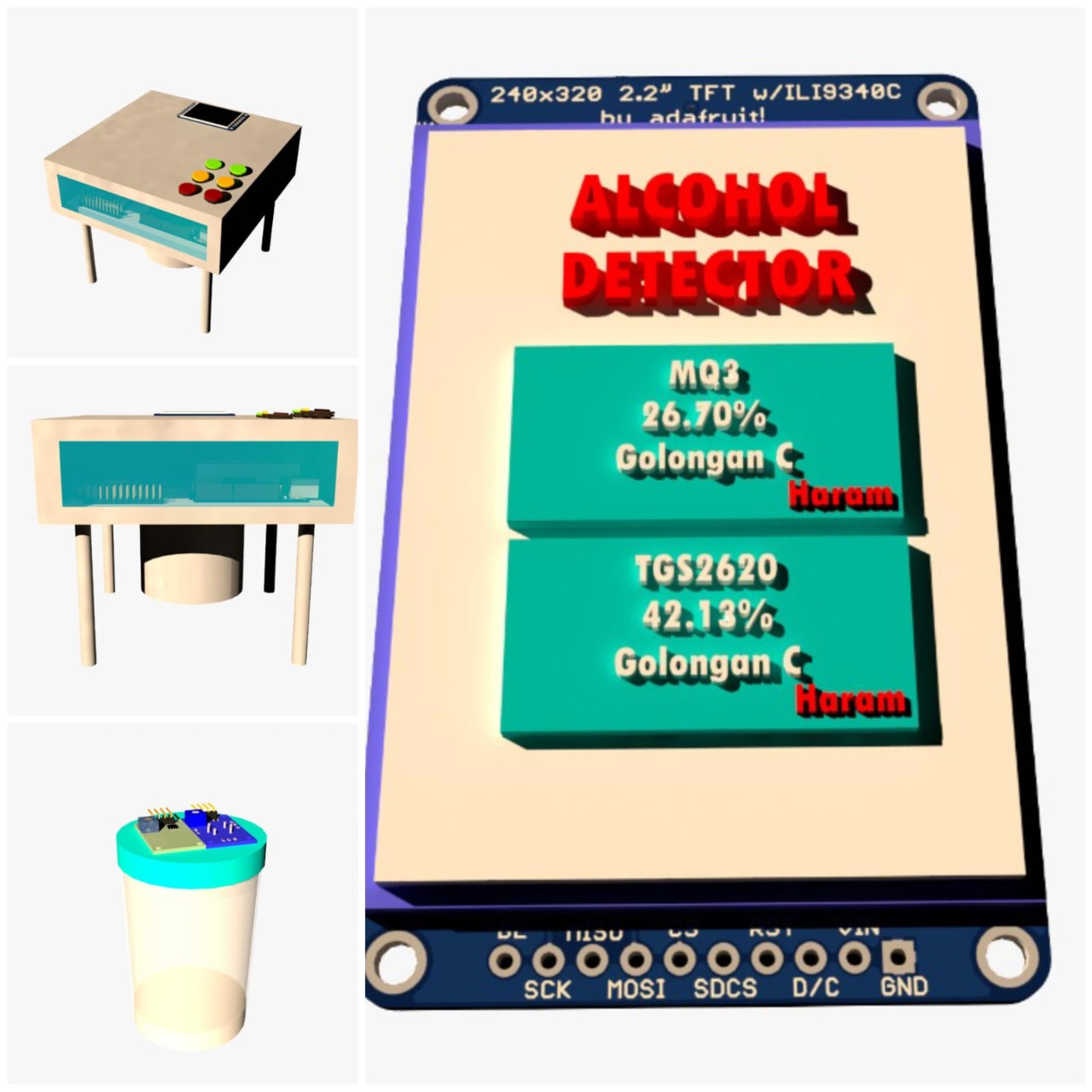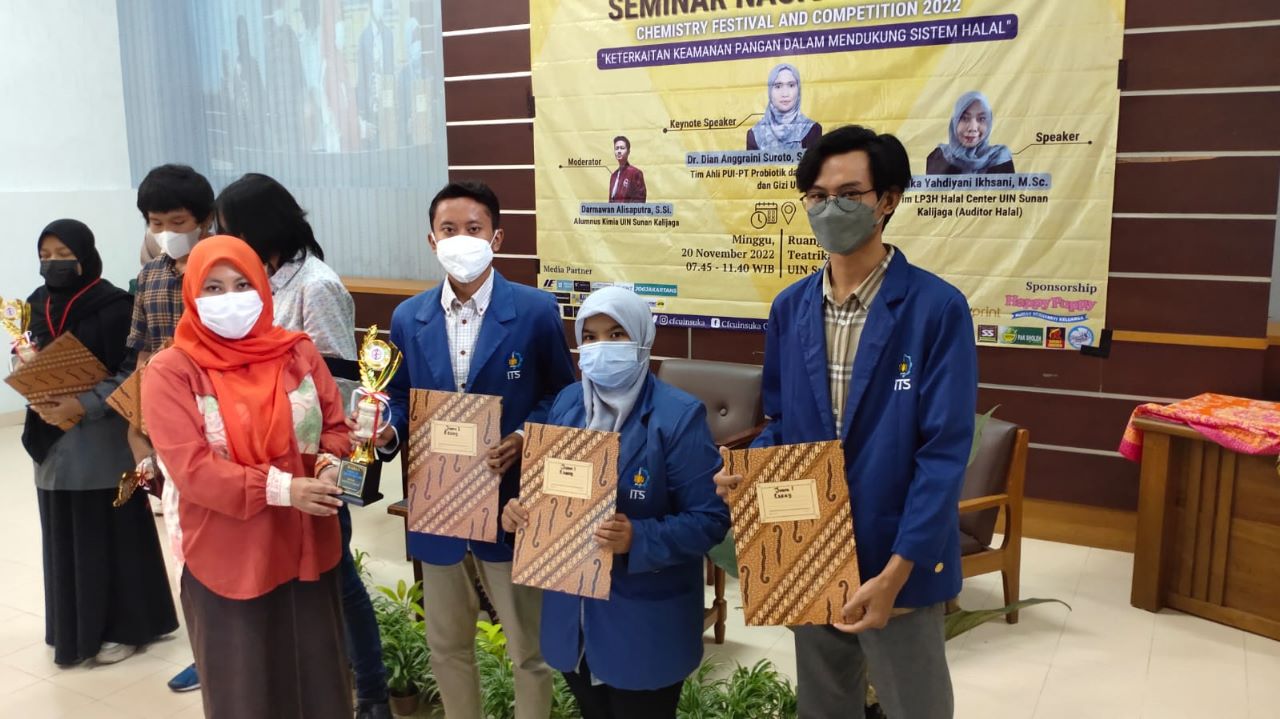Helping UMKM to Gain Halal Certificate, ITS Students Innovate Alcohol Detector

(from left) Rafly Zaka Rulloh, Alfinda Aurell Salsabila, and Wiji Dharma Aditya from the ITS Instrumentation Engineering Department when they won 1st place in an essay competition in Yogyakarta
ITS Campus, ITS News – A team of students from Institut Teknologi Sepuluh Nopember (ITS) succeeded in developing an alcohol detection device that is capable of detecting the amount of alcohol content in a beverage product. This tool innovation is intended for Micro, Small and Medium Enterprises (MSMEs) who need to check their processed beverage products to obtain halal certificates.
Team from Department Instrumentation Engineering, the ITS Vocational Faculty consists of Wiji Dharma Aditya, Rafly Zaka Rulloh, and Alfinda Aurell Salsabila. The three of them raised this innovation in an essay entitled Alcohol Detector for Verifying Halal Beverages Integrated with Smartphones to Support Home Industry Scale Food Safety Management.
Alfinda Aurell Salsabila, a member of the team, admitted that the theme of food safety was based on the noble goal of helping home industry scale MSMEs that had just emerged after the Covid-19 pandemic. “Currently there are a lot of new MSMEs engaged in processed drinks, especially on a home industry scale,” said this third year student.

The innovative design of an alcohol detection device was the result of developing the idea of a team of students from the ITS Instrumentation Engineering Department
One of the obstacles faced by home industry scale MSME players is that it takes quite a long time to obtain halal certification from the Indonesian halal guarantee institution, namely the Indonesian Ulema Council (MUI). Obtaining halal certification requires a long process if done independently and without the aid of sophisticated tools. “So the emergence of this alcohol detection innovation in drinks is intended to answer the concerns of small-scale beverage product MSMEs,” Alfinda said.
The development of an alcohol detection device for this drink uses the MQ 3 and TGS 2620 sensor technology. The MQ-3 Gas Sensor (Alcohol, Ethanol, Smoke) is a sensor that can detect the presence of alcohol gas in concentration of 0.05 mg/L up to 10 mg/L. “Validation, sensitivity and accuracy of data from sensor readings is what we strive for to produce a perfect value,” she said.
Alfinda explained that the sensor from the alcohol detection device initiated by his team will detect the amount of alcohol content in a beverage product. This can later ensure halal claim for a beverage product by showing the results of the numbers stating that the product is alcohol free.
The student who is originally from Surabaya explained that using this alcohol detection device is quite easy to operate. First, the beverage product is put into the detection jar which will then be placed on the sensor on the lid of the jar. Then the jar is closed and the alcohol content in the drink will be detected. The reading results of this tool will appear on the LCD screen or smartphone which makes it easier for users.

ITS student team received the first winner trophy for the Chemistry Festival and Competition Essay Contest in Yogyakarta
The development of this alcohol detection tool received direct guidance from one of ITS Instrumentation Engineering Department lecturers Ir Ahmad Fauzan Adziimaa ST MSc. This innovation has also succeeded in bringing the ITS team to win 1st place in the Chemistry Festival and Competition (CFC) competition organized by the Chemistry Study Program Student Association UIN Sunan Kalijaga Yogyakarta, the results of which were announced on the last Sunday (20/11).
This proud achievement in the national level chemistry competition is worth achieving because the alcohol detection tool in this drink has been in development since six months ago. “We have also tested this tool on several samples in the ITS Instrumentation Engineering Department,” added Alfinda convincingly.
In the future, the team hopes that the tools that have been innovated can later be developed more broadly, so that all MSME players, especially those who are still on a home industry scale, can benefit from them throughout Indonesia.(ITS Public Relation)
Related News
-
ITS Collaboration with BPBD East Java, Launching VR Disaster Simulation
ITS Campus, ITS News — Supporting anticipation of disasters and continuing to educate the public, Institut Teknologi Sepuluh Nopember
November 22, 2022 21:11 -
Supporting the Implementation of Innovative Ideas, ITS and IYSA Hold International Competition
ITS Campus, ITS News — Institut Teknologi Sepuluh Nopember (ITS) has once again proven its commitment to supporting the
November 22, 2022 21:11 -
ITS Maintains Informative Qualification for Five Consecutive Years at KIP Awards
ITS Campus, ITS News — Institut Teknologi Sepuluh Nopember (ITS) has once again successfully maintained its Informative Qualification predicate
November 22, 2022 21:11 -
ITS Strengthens Smart Eco-Campus through UI GreenMetric 2024
ITS Campus, ITS News — Institut Teknologi Sepuluh Nopember (ITS) has once again demonstrated its commitment to environmental concern
November 22, 2022 21:11
